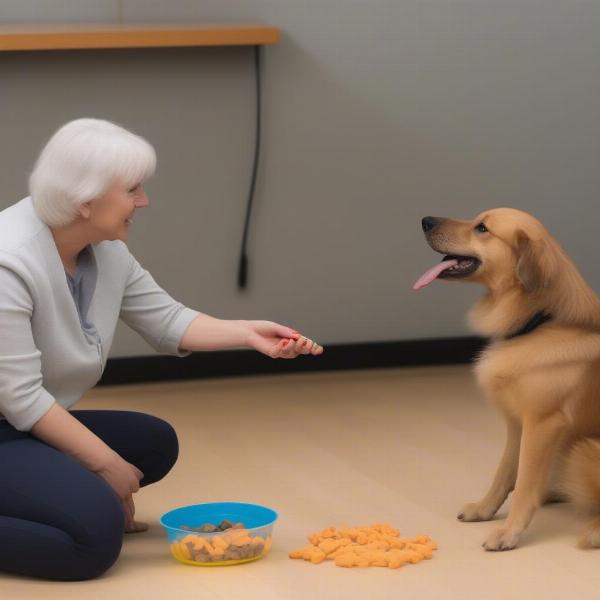Obsessive-Compulsive Disorder (OCD) in dogs, like in humans, manifests as repetitive behaviors performed out of context. While a dog occasionally chasing its tail can be normal play, persistent tail-chasing, excessive licking, flank sucking, or shadow chasing can indicate canine compulsive disorder. This article aims to help you understand whether your dog might have OCD and provide guidance on what steps to take if you suspect they do. “Does my dog have OCD quiz?” is a common search term for concerned owners, and we’ll explore the signs, diagnosis, and management of this complex condition.
Recognizing Potential OCD Behaviors in Your Dog
Several behaviors can point towards canine compulsive disorder. While these actions might seem harmless at first, they can significantly impact a dog’s well-being if they become excessive and interfere with their daily life. Is your dog constantly licking a specific spot on their leg, even to the point of creating a wound? Do they chase their tail relentlessly, seemingly unable to stop? These could be signs of OCD. Other common compulsive behaviors include fly snapping (biting at imaginary flies), pacing, circling, barking at nothing, and excessive grooming. It’s important to remember that these behaviors alone don’t necessarily confirm OCD, but they warrant further investigation.
Differentiating Normal Behavior from Compulsive Behavior
All dogs engage in some repetitive behaviors, like scratching or sniffing. How can you tell the difference between normal dog behavior and a potential compulsive disorder? Frequency, intensity, and context are key. A dog scratching an itch is normal; a dog persistently scratching even when there’s no apparent irritation is not. If the behavior seems to provide no obvious benefit or pleasure and interferes with your dog’s ability to eat, sleep, or interact normally, it might be a compulsive behavior. Consider also the context. Does the behavior occur more often when your dog is stressed or anxious? This can be a strong indicator of OCD.
The Importance of Veterinary Diagnosis
If you suspect your dog might be exhibiting signs of OCD, the first step is to consult your veterinarian. They will conduct a thorough physical examination and take a detailed history of your dog’s behavior. This is crucial to rule out any underlying medical conditions that might be contributing to the behavior, such as allergies, pain, or neurological issues.
Understanding the “Does My Dog Have OCD Quiz” Mindset
Owners often search for “does my dog have OCD quiz” online hoping for a quick answer. While online quizzes can be a starting point for awareness, they cannot replace a professional diagnosis. These quizzes can help you recognize potential symptoms and encourage you to seek veterinary advice, but they shouldn’t be relied upon for a definitive diagnosis. Only a veterinarian can accurately assess your dog’s individual situation and rule out other potential causes for the behavior.
Treatment and Management of Canine OCD
Treatment for canine OCD typically involves a combination of behavior modification therapy and medication. Behavior modification focuses on identifying and managing the triggers for the compulsive behaviors and teaching your dog alternative, healthier coping mechanisms. Medication, such as selective serotonin reuptake inhibitors (SSRIs), can help reduce anxiety and improve your dog’s responsiveness to behavior modification. It’s essential to work closely with a certified veterinary behaviorist or a veterinarian experienced in treating canine compulsive disorders to develop a tailored treatment plan for your dog.
 Dog Training with Behavior Modification
Dog Training with Behavior Modification
Conclusion
Recognizing the signs of OCD in dogs is the first step towards helping them live a happier, healthier life. While searching for “does my dog have OCD quiz” is a common starting point, it’s essential to consult with a veterinarian for a proper diagnosis and personalized treatment plan. By addressing the underlying anxiety and teaching your dog alternative coping mechanisms, you can significantly improve their overall well-being and help them manage their compulsive behaviors.
FAQ
- How can I tell if my dog’s licking is due to OCD or allergies? Excessive licking due to allergies often involves multiple areas, especially paws and ears, and may be accompanied by other allergy symptoms like sneezing or itching. OCD licking tends to be focused on a single spot. Consult your veterinarian for a definitive diagnosis.
- Can canine OCD be cured? While there’s no cure for canine OCD, it can be effectively managed with appropriate treatment, allowing dogs to live comfortable and fulfilling lives.
- Are certain breeds more prone to OCD? Some breeds appear to have a higher predisposition to certain compulsive behaviors, suggesting a genetic component. However, any breed can develop OCD.
- What should I do if I suspect my dog has OCD? Schedule an appointment with your veterinarian as soon as possible. They can evaluate your dog’s behavior and recommend appropriate next steps.
- Is punishment effective for managing OCD behaviors? Punishment is never recommended for compulsive behaviors. It can worsen anxiety and exacerbate the problem. Focus on positive reinforcement and behavior modification instead.
- Can changes in environment or routine trigger OCD? Stressful events or changes in routine can sometimes trigger or worsen OCD behaviors in dogs.
- How long does treatment for canine OCD take? The length of treatment varies depending on the severity of the OCD and the individual dog. It’s a long-term commitment that requires patience and consistency.
About ILM Dog
ILM Dog is your trusted international resource for expert canine care advice. We offer comprehensive information on dog breeds, health, training, nutrition, grooming, and much more, catering to both novice and experienced dog owners worldwide. Whether you are trying to understand canine behavior, looking for training advice, or simply want to enrich your relationship with your dog, we provide practical tips and guidance backed by expert knowledge. For personalized support and expert advice on your dog’s individual needs, contact us via email at [email protected] or by phone at +44 20-3965-8624.